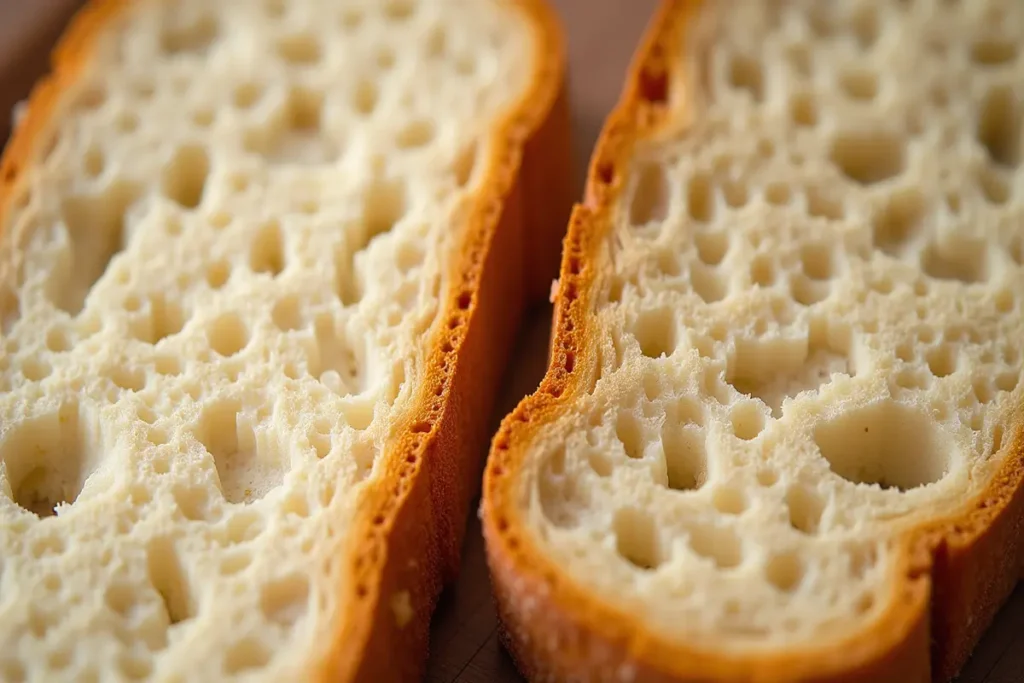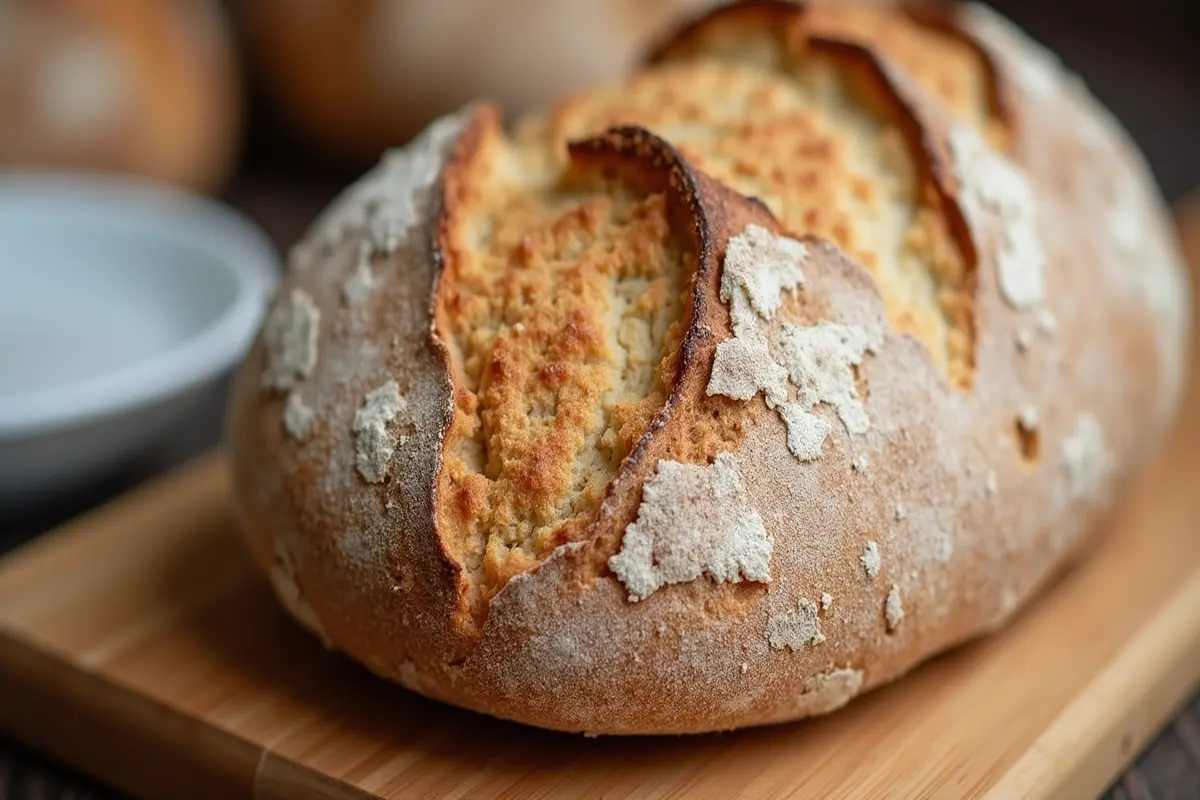Why is sourdough bread not fattening is a question many health-conscious individuals ponder. Why sourdough bread is not fattening is a common concern. This ancient bread, with its tangy flavor and chewy texture, has experienced a resurgence in popularity. But unlike some processed breads, sourdough offers a unique nutritional profile that may be beneficial for weight management. Let’s delve into the factors that make sourdough a potentially waistline-friendly choice, and further explore why sourdough bread is not fattening as opposed to commercial breads.
Table of Contents
The Amazing Sourdough Process
Why is sourdough bread not fattening?The secret behind why sourdough bread is not fattening lies in its fermentation process. Traditional sourdough is made using a “starter,” a culture of wild yeast and lactic acid bacteria. This starter ferments the dough over a period of hours, or even days, which sets it apart from commercially produced breads that use baker’s yeast for quick rising. So, is it really that the fermentation is key to why sourdough bread is not fattening?
The Role of Fermentation
Fermentation breaks down starches into simpler sugars, making them easier to digest. Furthermore, this process can reduce the bread’s glycemic index (GI). The glycemic index measures how quickly a food raises blood sugar levels. Foods with a lower GI are absorbed more slowly, leading to a more gradual rise in blood sugar and insulin. This is another key detail for why sourdough bread is not fattening.
Reduced Glycemic Index
A lower glycemic index can help prevent energy crashes and reduce cravings, ultimately contributing to better weight management. Therefore, the fermentation process is a crucial factor in why sourdough bread is not fattening.
Sourdough’s Nutritional Profile

Understanding sourdough’s nutritional composition is key to explaining why sourdough bread is not fattening. While it’s still a carbohydrate source, sourdough offers some distinct advantages over other breads. Understanding this profile can ease minds when questioning why sourdough bread is not fattening.
Fiber Content
Sourdough bread generally contains a good amount of fiber, especially if made with whole-grain flour. Fiber promotes satiety, meaning it helps you feel fuller for longer, which can reduce overall calorie intake. When diving deep into why sourdough bread is not fattening, fiber content is key.
Nutrient Availability
The fermentation process in sourdough also increases the bioavailability of certain nutrients. This means your body can absorb and utilize the vitamins and minerals in the bread more effectively. These include B vitamins, iron, and zinc. This boost also helps solidify why sourdough bread is not fattening.
Prebiotic Benefits
Sourdough contains prebiotics, which are types of fiber that feed the beneficial bacteria in your gut. A healthy gut microbiome is linked to various health benefits, including improved digestion and weight management. These contribute, in part, to why sourdough bread is not fattening.
The Impact on Blood Sugar
One of the primary reasons why sourdough bread is not fattening is its impact on blood sugar levels. The lower glycemic index, resulting from the fermentation process, leads to a more stable and controlled release of glucose into the bloodstream. This is crucial to consider why sourdough bread is not fattening.
Insulin Sensitivity
Stable blood sugar levels are crucial for maintaining insulin sensitivity. Insulin is a hormone that helps transport glucose from the blood into cells for energy. When blood sugar levels spike frequently, the body can become resistant to insulin, which can lead to weight gain and other health problems.
Reduced Cravings
By promoting stable blood sugar levels, sourdough can help reduce cravings for sugary and processed foods. This can contribute to a healthier diet overall, making it easier to maintain a healthy weight.
Comparing Sourdough to Other Breads

To truly understand why sourdough bread is not fattening, it’s important to compare it to other common types of bread.
White Bread
White bread is made from refined flour, which is stripped of its fiber and nutrients. It has a high glycemic index, leading to rapid spikes in blood sugar levels. Consequently, white bread is more likely to contribute to weight gain than sourdough.
Whole Wheat Bread
While whole wheat bread is generally healthier than white bread, it may not always be as beneficial as sourdough. Some commercially produced whole wheat breads still contain added sugars and other ingredients that can negatively impact blood sugar levels and weight management. Sourdough, with its slow fermentation process, offers a unique advantage.
Understanding the Difference
The slower fermentation process in sourdough impacts the digestibility and nutritional profile, making it a favorable choice compared to other breads.
Portion Control and Moderation
While sourdough has its benefits, it’s important to remember that portion control is key. Even healthy foods can contribute to weight gain if consumed in excess.
Recommended Serving Sizes
Stick to recommended serving sizes of sourdough bread, which is typically one or two slices. Be mindful of what you’re adding to your bread, as toppings like butter, jam, and cheese can significantly increase the calorie content.
Balancing Your Diet
Sourdough bread should be part of a balanced diet that includes plenty of fruits, vegetables, lean protein, and healthy fats. Combining sourdough with other nutritious foods can help you stay full and satisfied while managing your weight effectively.
Debunking Sourdough Myths

There are some common misconceptions about sourdough bread that need to be addressed.
Myth: Sourdough is Gluten-Free
Sourdough is not gluten-free. While the fermentation process can break down some of the gluten proteins, it still contains gluten and is not suitable for people with celiac disease or gluten sensitivity.
Myth: Sourdough is Calorie-Free
Sourdough is not calorie-free. It still contains calories from carbohydrates, protein, and fats. However, its nutritional profile and impact on blood sugar levels can make it a healthier choice compared to other breads.
Setting the Record Straight
Understanding these myths is crucial to making informed dietary choices. Enjoy sourdough as part of a well-rounded eating plan for optimal health.
Sourdough and Exercise
Combining sourdough with a regular exercise routine can amplify its benefits for weight management.
Pre-Workout Fuel
Sourdough can be a good source of carbohydrates before a workout, providing sustained energy without causing a rapid spike in blood sugar. Opt for a slice or two of whole-grain sourdough with a light topping, such as avocado or a small amount of nut butter.
Post-Workout Recovery
After exercise, sourdough can help replenish glycogen stores and aid in muscle recovery. Pairing it with a source of protein, like eggs or Greek yogurt, can further enhance recovery and promote muscle growth.
Overall Fitness
Remember that exercise plays a crucial role in overall health and weight management. Sourdough, when incorporated into a balanced diet and active lifestyle, can contribute to your fitness goals.
Choosing the Right Sourdough
Not all sourdough breads are created equal. It’s essential to choose high-quality sourdough to reap the most benefits.
Ingredients Matter
Look for sourdough breads made with simple ingredients, such as flour, water, and salt. Avoid breads with added sugars, preservatives, or artificial ingredients.
Whole-Grain Options
Opt for whole-grain sourdough breads whenever possible. Whole-grain flours are richer in fiber and nutrients than refined flours.
Local Bakeries
Consider purchasing sourdough from local bakeries or farmers’ markets. These breads are often made with traditional methods and high-quality ingredients. By understanding these points, you can maximise the benefits of sourdough
Delicious Ways to Enjoy Sourdough
Beyond the health benefits, sourdough’s unique flavor and texture make it incredibly versatile in the kitchen. Here are some delicious ways to incorporate it into your diet.
Sourdough Toast
Simple yet satisfying, sourdough toast can be topped with avocado, eggs, nut butter, or a variety of savory or sweet spreads. The tangy flavor of the bread complements a wide range of ingredients.
Sourdough Sandwiches
Sourdough makes an excellent base for sandwiches. Its sturdy texture holds up well to fillings, and its slightly sour flavor adds depth to any combination of meats, cheeses, and vegetables.
Sourdough Croutons
Transform stale sourdough into flavorful croutons for salads and soups. Toss cubed sourdough with olive oil, herbs, and spices, then bake until golden brown and crispy.
Sourdough Grilled Cheese
Elevate your grilled cheese game with sourdough bread. The tangy flavor and crispy crust create a delightful contrast with the melted cheese.
Sourdough Recipes to Try
To further inspire your sourdough journey, here are a couple of simple recipes you can try at home.
Avocado Toast with Sourdough
Ingredients: Sliced sourdough bread, avocado, red pepper flakes, salt, pepper, and everything bagel seasoning. Instructions: Toast the sourdough slice until golden. Mash avocado and spread on toast. Sprinkle with red pepper flakes, salt, pepper, and everything bagel seasoning.
Sourdough Grilled Cheese Sandwich
Ingredients: Sliced sourdough bread, cheddar cheese, butter. Instructions: Butter one side of each slice of bread. Place one slice, butter-side down, in a skillet. Add cheese and top with the other slice of bread, butter-side up. Cook over medium heat until golden brown and cheese is melted.
Image Placeholder: alt text includes “Delicious Sourdough Grilled Cheese Sandwich”
Image Placeholder: alt text includes “Avocado Toast with Sourdough”
Benefits of Making Your Own Sourdough Starter
Creating your own sourdough starter can be a rewarding experience, offering benefits beyond just great-tasting bread.
Control Over Ingredients
When you make your own starter, you know exactly what goes into it. This allows you to use high-quality flours and water, ensuring a pure and flavorful starter.
Customization
You can customize your starter to suit your preferences. Experiment with different types of flour, such as rye or whole wheat, to create unique flavor profiles.
Connection to Tradition
Making your own starter connects you to a long history of bread-making. It’s a way to honor traditional methods and appreciate the art of fermentation.
Troubleshooting Common Sourdough Problems
Making sourdough can sometimes be challenging. Here are some common problems and how to solve them.
Flat Bread
A flat loaf can be caused by a weak starter, under-proofing, or not enough gluten development. Strengthen your starter with regular feedings, proof the dough for the appropriate amount of time, and ensure proper kneading.
Dense Texture
A dense texture can result from over-kneading or under-fermentation. Be gentle with your dough, and allow it to ferment for the recommended time.
Sour Flavor
If your sourdough is too sour, try reducing the fermentation time or adjusting the temperature. Cooler temperatures generally result in a milder flavor.
Image Placeholder: alt text includes “Homemade Sourdough Starter”
Image Placeholder: alt text includes “Flat Sourdough Bread”
Exploring Sourdough Varieties
The world of sourdough is vast and diverse, with different flours and techniques resulting in a wide array of flavors and textures.
San Francisco Sourdough
Known for its distinctively sour flavor, San Francisco sourdough is a classic variety that’s perfect for sandwiches and toast.
Country Sourdough
Country sourdough is a more rustic loaf with a slightly milder flavor and a chewy texture. It’s often made with a blend of white and whole-wheat flour.
Rye Sourdough
Rye sourdough has a hearty flavor and a dense texture, making it a great choice for pairing with savory toppings.
Sourdough in Different Cultures
Sourdough bread has a rich history and is enjoyed in various cultures around the world, each with its unique twists and traditions.
Europe
In many European countries, sourdough is a staple food, with each region having its own distinctive style and recipe.
North America
Sourdough has a special place in North American cuisine, particularly in San Francisco, where it’s considered a culinary icon.
Other Regions
From Russia to the Middle East, sourdough is cherished for its flavor, texture, and versatility. It’s a testament to the enduring appeal of this ancient bread.
Image Placeholder: alt text includes “San Francisco Sourdough Bread”
Image Placeholder: alt text includes “European Sourdough Breads”
The Long-Term Health Benefits of Sourdough
Beyond weight management, incorporating sourdough into your diet can offer various long-term health benefits.
Improved Digestion
The fermentation process breaks down gluten proteins, making sourdough easier to digest for some people, but still not safe for Celiac.
Better Blood Sugar Control
Sourdough’s lower glycemic index can help regulate blood sugar levels, reducing the risk of insulin resistance and type 2 diabetes.
Increased Nutrient Absorption
The fermentation process increases the bioavailability of certain nutrients, allowing your body to absorb them more effectively.
Simple Swaps: Replacing Unhealthy Breads with Sourdough
Making simple swaps in your diet can have a significant impact on your overall health and weight management.
White Bread to Sourdough
Replace white bread with sourdough for sandwiches, toast, and other uses to benefit from its lower glycemic index and higher fiber content.
Processed Bread to Sourdough
Swap out processed breads with additives and preservatives for a loaf of freshly baked sourdough for a more nutritious option.
Sweet Breads to Sourdough
Reducing intake of sweet, processed breads and replacing with sourdough may reduce sugar intake in the long-term.
Image Placeholder: alt text includes “Sourdough for Long Term Health”
Image Placeholder: alt text includes “Sourdough Bread Swap.”
FAQ
Is sourdough bread better for weight loss?
Sourdough bread may be a better choice for weight loss compared to white bread due to its lower glycemic index and higher fiber content. These factors can help control blood sugar levels and promote satiety.
Does sourdough bread have less carbs?
Sourdough bread does not necessarily have fewer carbs than other breads, but the fermentation process can break down some of the carbohydrates, potentially making them easier to digest. The glycemic index is more relevant than the total carb count for weight management.
Can you eat sourdough bread every day?
Yes, you can eat sourdough bread every day as part of a balanced diet. However, it’s important to practice portion control and choose whole-grain varieties for the most nutritional benefits.
Is sourdough bread high in sodium?
Sourdough bread can be high in sodium, depending on the recipe and preparation methods. Check the nutrition label and choose lower-sodium options if you are watching your sodium intake.
FORE MORE RECIPES

